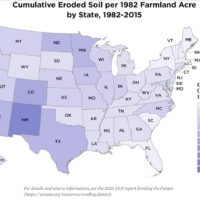People have to be careful blaming the farmer when in many cases they only understand part of the picture.
Fall tillage is so common with corn/soybean growers because in the northern tier everyone’s trying to maximize their growing season. Tillage in the fall gives the residue more time to break down so it doesn’t foul the planter and turning the fields black enables them to warm up and dry out in the spring much faster than residue-covered fields, so it can enable earlier planting dates.
In the northern tier, producers are in a race for growing time and spring tillage is seen as wasted time that could have been spent planting. If you’re going to wait until things dry out enough to do all your tillage in the spring, they feel that puts them behind and wastes growing season that could have been used to increase yields.
Yes, erosion is an issue. But so is soil compaction and running equipment over wet ground in the spring leads to far greater compaction. Everything is a tradeoff. Most producers now are using less intensive tillage and going to the minimum possible disturbance to minimize erosion and save both fuel and passes over the field to reduce compaction damage. A far cry from the old days when everyone was plowing and leaving high ridges of soil standing up in the wind.
I agree, I would like to see way more CRP, way less fencerow to fencerow, and far larger buffer strips. But people need to understand that CRP is capped by the available acreage, so right now in many areas, farmers can’t get ground into CRP even if they want to because program acreage is not available.
I would also like to see greater use of cover and conditioning crops for erosion prevention and soil health.
Working in the Ag industry, the main thing I hear is “Thats what dad and grandpa always did.” and refusing to change ways. The younger generation is getting much better at practicing no till practices
This is what I’m seeing as well, but what people need to understand is that no till has limits as to how and where it can be used. Not every farm can go no-till. It is highly successful in dry ground farming in the wheat belt, especially with winter crops that are seeded in the late summer or fall when the ground is dry. Taking no-till planting, for example, gets more difficult or even impossible in heavy soils, heavy residue, and on wet ground in the spring.
Farmers are business people now first and foremost. If we want different environmental practices, then we need to be willing to pay for them. Just look at the complaining at the costs of meat and food rising and you’ll see how hard it would be to get people to accept more expensive means of production.
